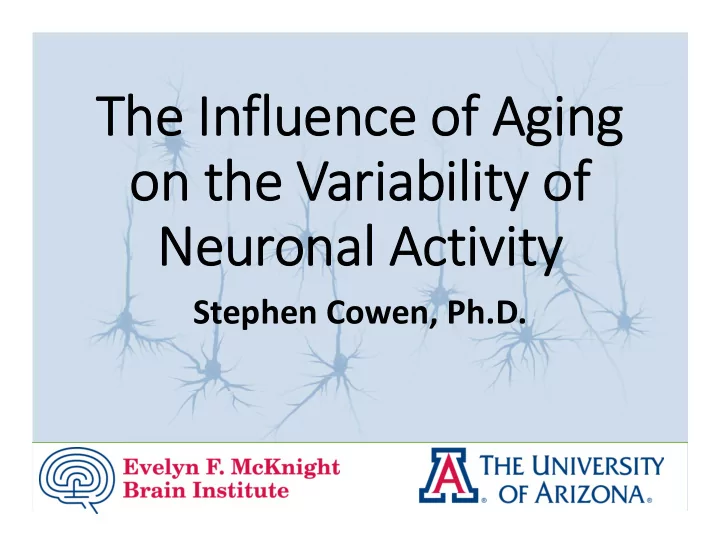

The The Infl fluence uence of of Agi Aging on on the the Variab riability ility of of Neur Neuronal onal Acti Activity vity Stephen Cowen, Ph.D.
Less of it Phase advance Intermittent waking Critical for the consolidation of episodic memories
Episode Episode ‐ lik like in informatio ion is is re re ‐ pla played ed in in the the hi hippoc ppocam ampus pus during during sleep sleep Neuron 1 2 3 Z Z Z Z Z Z Wilson, M. A., & McNaughton, B. L. B. (1994). Reactivation of hippocampal ensemble memories during sleep. Science , 5 (14), 5–8.
Thi This “r “reactiv eactivatio ion” occur occurs mos mostly duri during ri rippl pple oscilla oscillatio ions Z Z Z 100 150 Hz 200 250 -40 -20 0 20 40 60 80 ms Kudrimoti, H. S., Barnes, C. A., & McNaughton, B. L. (1999). Reactivation of hippocampal cell assemblies: effects of behavioral state, experience, and EEG dynamics. J Neurosci , 19 (10), 4090–101.
Theory
Reduced neuronal reliability could impair this process…
Given that aging is associated with reduced capacity to encode and recall episodic memories… Gener General Hypothesi Hypothesis: Ripple ‐ associated neuronal activity will be associated with more variability.
Schimanski, L. a, Lipa, P., & Barnes, C. a. (2013). Tracking the course of hippocampal representations during learning: when is the map required? The Journal of Neuroscience : The Official Journal of the Society for Neuroscience , 33 (7), 3094–106.
20 ms
Variance Mean 1.35 1.3 1.25 Fano Young 1.2 Aged 1.15 -600 -400 -200 0 200 400 600 ms 1.15 1.1 Fano 1.05 1.0 0.95 -600 -400 -200 0 200 400 600 ms
Young Aged
Phase coding hypothesis 0 360 20 ms
(a between ‐ neuron measure)
Im Implic plication ions • Adaptive process. Reduced variability may be a good thing. Larger synapses could compensate for synaptic pruning. • Possible Negative Consequence: The aged brain has a more limited “vocabulary” available for encoding new memories. • Translation: Approaches that increase variability in a targeted way may enhance encoding of new information. • TCDCS, TMS, drugs (NE). • Future: 1) Investigate reactivation of previous experience, efficacy of reactivation in aged animals with preserved and impaired performance on memory tasks. 2) Interventions that alter ripple density or amplitude. 3) Dopamine
Acknowledg Acknowledgem emen ents ts • Jean ‐ Paul Wiegand • Daniel Gray • Tony Ye • Many fantastic undergraduates “To our relatives, the Rodents, with • Carol Barnes apologies.” • Lesley Schimanski – Valentino Braitenberg (1998)
Future Directions • Determine if reactivation (a correlate of consolidation) is Z Z this impaired or actually Z increased in aged animals that… • Do well on memory tasks. • Explore techniques, such as TDCS or drug therapies that could potentially increase ripple density.
Recommend
More recommend